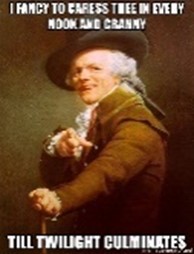Did you lose your car keys? If that's the case, you're going to want to search every "nook and cranny" to find them, or you're going to walk home.
This post unpacks everything you need to know about this idiomatic expression's origin, meaning, and use.
Nook and Cranny Meaning
"Nook and cranny" means to search every possible place in an area. You'll look in all of the places where you would normally never look when searching for something. The phrase is common in the modern English language. You'll use it to impress others that you will make your best effort to search for something.
You can apply the term to search for any item, from your car keys to crickets chirping somewhere in your room to someone lost in a national park. To explore every "nook and cranny" can have a practical meaning in searching for objects or people, and it can have a sexual innuendo behind it as well.
For instance, if you were to search every "nook and cranny" on your partner's body, it means that you're going to explore their private parts, where no one would usually look. Typically, people will use the term in reference to searching for objects or people rather than in the sexual meaning of the idiom.
Nook and Cranny Example Usage
"We searched every nook and cranny in the backyard looking for Sheila's toy, but we couldn't find it anywhere."
"The rescue team will search every nook and cranny in the area to find her; we'll get her back to her family safe."
"The attorney searched every nook and cranny of the case file to find a way to get the defendant acquitted."
"I searched every nook and cranny in the car, but I can't find the gate remote."


Nook and Cranny Origin
The phrase "nook and cranny" originates from the 14th century. The term combines the words "nook" and "cranny." We'll unpack the origin of these words first. "Nook" defines a small corner in the distance. The word first appeared in the 1300s.
"Cranny" means a gap or crack, and it first appeared in language in 1440. The oldest record of the combination of the words traces back to the book "Scottish Scenery" by author James Carrie, first published in 1803.
The novel uses the phrase in the following excerpt from the book.
"The piercing frost, the mass of drifted snow,
That smooths the valley with the higher ridge,
And ev'ry winding nook and cranny fills?"
Records show the use of the phrase in Scottish English and Middle English, tracing back to the 1600s. The nouns "nook" and "cranny" rarely feature in the modern language other than their combined idiomatic format.
Phrases Similar to Nook and Cranny
- Leave no stone unturned.
- Search high and low.
Phrases Opposite to Nook and Cranny
- A brief once over.
- At a glance.
What is the Correct Saying?
- Nook and cranny.
- Nooks and crannies.
Ways People May Say Nook and Cranny Incorrectly
Some people may use the phrase inaccurately, describing a weak effort to find something. They may also use it to describe the act of rock climbing, which is the incorrect use of the term.
Acceptable Ways to Phrase Nook and Cranny
You can use "nook and cranny" when you're trying to emphasize that you're going to conduct a thorough search of a person, object, or property. The phrase suits use in professional and social settings when you're trying to emphasize that you'll do whatever it takes to uncover hidden information. The phrase means that you will examine every aspect of something, leaving nothing untouched.